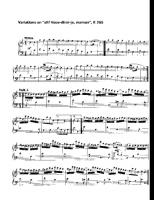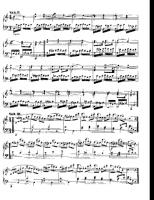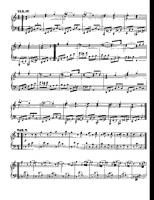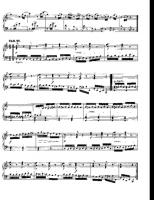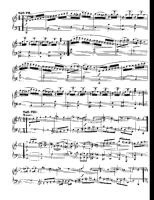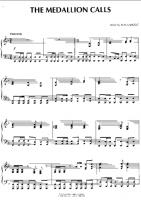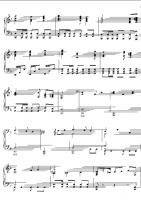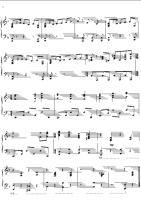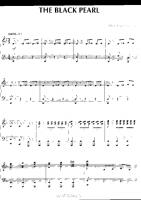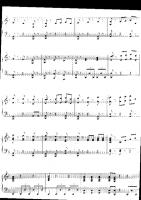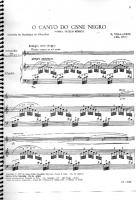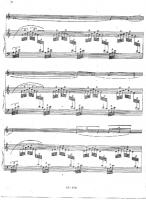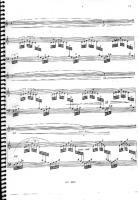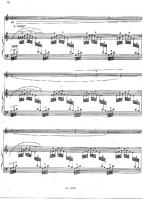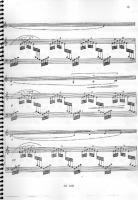Piano Sheet Music
 "Music expresses that which cannot be put into words and that which cannot remain silent." William Congreve
"Music expresses that which cannot be put into words and that which cannot remain silent." William Congreve
Chopin
 Frédéric Chopin (1 March 1810 – 17 October 1849) was a Polish composer and virtuoso pianist of the Romantic period. He is widely regarded as the greatest Polish composer, and ranks as one of music's greatest tone poets.
Frédéric Chopin (1 March 1810 – 17 October 1849) was a Polish composer and virtuoso pianist of the Romantic period. He is widely regarded as the greatest Polish composer, and ranks as one of music's greatest tone poets.He was born in the village of Żelazowa Wola, in the Duchy of Warsaw, to a Polish mother and French-expatriate father, and in his early life was regarded as a child-prodigy pianist. In November 1830, at the age of 20, Chopin went abroad; following the suppression of the Polish November Uprising of 1830–31, he became one of many expatriates of the Polish "Great Emigration."
In Paris, he made a comfortable living as a composer and piano teacher, while giving few public performances. A Polish patriot,
Chopin's extant compositions were written primarily for the piano as a solo instrument. Though technically demanding, Chopin's style emphasizes nuance and expressive depth rather than virtuosity. Chopin invented musical forms such as the ballade and was responsible for major innovations in forms such as the piano sonata, waltz, nocturne, étude, impromptu and prelude. His works are mainstays of Romanticism in 19th-century classical music.
Traditional
 traditional music
traditional music
Sally DeFord
 Sally DeFord Musical artist Born: 1959 (age 60 years), Eugene, Oregon, United States
Sally DeFord Musical artist Born: 1959 (age 60 years), Eugene, Oregon, United StatesRecord labels: Defordmusic, Defordmusic.com, Sally DeFord Music, Sally DeFord
Genres: Alt Contemporary Christian, Christian/Gospel
Albums: He Is My Song, MORE
Procol Harem
Procol Harum are an English rock band formed in 1967. Their best-known recording is the 1967 hit single "A Whiter Shade of Pale", one of the few singles to have sold over 10 million copies.
Vu duc sao bien
 Vu Duc Sao Bien (February 12, 1947 – May 6, 2020) was a Vietnamese musician, writer, journalist and teacher. When writing trivia, he used the pseudonyms Do Bi, Dinh Ba, and Mac Dai.
Vu Duc Sao Bien (February 12, 1947 – May 6, 2020) was a Vietnamese musician, writer, journalist and teacher. When writing trivia, he used the pseudonyms Do Bi, Dinh Ba, and Mac Dai.
Chabrier
 Alexis Emmanuel Chabrier (pronounced: ; January 18, 1841 – September 13, 1894) was a French Romantic composer and pianist. Although known primarily for two of his orchestral works, España and Joyeuse marche, he left an important corpus of operas (including the increasingly popular L'étoile), songs, and piano music as well. These works, though small in number, are of very high quality, and he was admired by composers as diverse as Debussy, Ravel, Richard Strauss, Satie, Schmitt, Stravinsky, and the group of composers known as Les six. Stravinsky alluded to España in his ballet Petrushka, Ravel wrote that the opening bars of Le roi malgré lui changed the course of harmony in France, Poulenc wrote a biography of the composer, and Richard Strauss conducted the first staged performance of Chabrier's incomplete opera Briséïs.
Alexis Emmanuel Chabrier (pronounced: ; January 18, 1841 – September 13, 1894) was a French Romantic composer and pianist. Although known primarily for two of his orchestral works, España and Joyeuse marche, he left an important corpus of operas (including the increasingly popular L'étoile), songs, and piano music as well. These works, though small in number, are of very high quality, and he was admired by composers as diverse as Debussy, Ravel, Richard Strauss, Satie, Schmitt, Stravinsky, and the group of composers known as Les six. Stravinsky alluded to España in his ballet Petrushka, Ravel wrote that the opening bars of Le roi malgré lui changed the course of harmony in France, Poulenc wrote a biography of the composer, and Richard Strauss conducted the first staged performance of Chabrier's incomplete opera Briséïs.Chabrier was also associated with some of the leading writers and painters of his time. He was especially friendly with the painters Claude Monet and Édouard Manet, and collected Impressionist paintings before Impressionism became fashionable. A number of such paintings from his personal collection are now housed in some of the world's leading art museums.
David Riordan
 David Riordan is an interactive media executive, producer and designer, a documentary television producer and a professional songwriter. He co-wrote the number-one hit "Green-Eyed Lady" for the band Sugarloaf in 1970, and released his first solo album in 1974 called Medicine Wheel.
David Riordan is an interactive media executive, producer and designer, a documentary television producer and a professional songwriter. He co-wrote the number-one hit "Green-Eyed Lady" for the band Sugarloaf in 1970, and released his first solo album in 1974 called Medicine Wheel.
Mylene Farmer
 Mylène Jeanne Gautier, known professionally as Mylène Farmer, is a French singer, songwriter, occasional actress, writer, and entrepreneur. She was born in Pierrefonds, Quebec, to a French family, and brought up in France.
Mylène Jeanne Gautier, known professionally as Mylène Farmer, is a French singer, songwriter, occasional actress, writer, and entrepreneur. She was born in Pierrefonds, Quebec, to a French family, and brought up in France.
Muse
 Muse are a British rock band formed in Teignmouth, Devon, United Kingdom in 1994 under the alias of Rocket Baby Dolls. The band comprises Matthew Bellamy (vocals, guitar and piano), Christopher Wolstenholme (bass guitar and backing vocals) and Dominic Howard (drums and percussion). Muse's style can be considered as a mixture of many musical genres, most notably alternative rock, classical music and electronica. Muse are known best for their energetic and visually dazzling live performances and on June 16th & 17th, 2007 became the first band to sell out the newly built Wembley Stadium in London. Muse have released four studio albums with their first, Showbiz, released in 1999, followed by Origin of Symmetry in 2001 and Absolution in 2003. The most recent, Black Holes & Revelations (2006), was also the most critically acclaimed, garnering the band a Mercury Prize nomination and a third place finish in the NME Albums of the Year list for 2006. Muse have won various awards throughout their career including 5 MTV Europe Music Awards, 5 Q Awards, 4 NME Awards and 2 Brit awards.
Muse are a British rock band formed in Teignmouth, Devon, United Kingdom in 1994 under the alias of Rocket Baby Dolls. The band comprises Matthew Bellamy (vocals, guitar and piano), Christopher Wolstenholme (bass guitar and backing vocals) and Dominic Howard (drums and percussion). Muse's style can be considered as a mixture of many musical genres, most notably alternative rock, classical music and electronica. Muse are known best for their energetic and visually dazzling live performances and on June 16th & 17th, 2007 became the first band to sell out the newly built Wembley Stadium in London. Muse have released four studio albums with their first, Showbiz, released in 1999, followed by Origin of Symmetry in 2001 and Absolution in 2003. The most recent, Black Holes & Revelations (2006), was also the most critically acclaimed, garnering the band a Mercury Prize nomination and a third place finish in the NME Albums of the Year list for 2006. Muse have won various awards throughout their career including 5 MTV Europe Music Awards, 5 Q Awards, 4 NME Awards and 2 Brit awards.
Clannad (film)
 Clannad (Japanese: クラナド, Hepburn: Kuranado) is a 2007 Japanese anime fantasy-drama film directed by Osamu Dezaki and based on the visual novel of the same name developed by Key. Toei Animation announced at the Tokyo Anime Fair on March 23, 2006 that an animated film would be produced, and was released theatrically by Toei Company on September 15, 2007. The film is a reinterpretation of the Clannad storyline which centers on the story arc of the female lead Nagisa Furukawa. It was the final film directed by Dezaki before his death in April 2011.
Clannad (Japanese: クラナド, Hepburn: Kuranado) is a 2007 Japanese anime fantasy-drama film directed by Osamu Dezaki and based on the visual novel of the same name developed by Key. Toei Animation announced at the Tokyo Anime Fair on March 23, 2006 that an animated film would be produced, and was released theatrically by Toei Company on September 15, 2007. The film is a reinterpretation of the Clannad storyline which centers on the story arc of the female lead Nagisa Furukawa. It was the final film directed by Dezaki before his death in April 2011.
Vocal Spectrum
 Vocal Spectrum is a barbershop quartet from St. Charles, Missouri. In 2004, Vocal Spectrum won the Barbershop Harmony Society's International Collegiate Quartet Contest, and on July 8, 2006, they became International Champions, winning the society's International Quartet Contest. A distinctive factor of the quartet is tenor Tim Waurick's ability to sustain notes for upwards of 30 seconds, and the tenor's and lead's incredibly high note range, featured in many of the group's recordings and live shows.
Vocal Spectrum is a barbershop quartet from St. Charles, Missouri. In 2004, Vocal Spectrum won the Barbershop Harmony Society's International Collegiate Quartet Contest, and on July 8, 2006, they became International Champions, winning the society's International Quartet Contest. A distinctive factor of the quartet is tenor Tim Waurick's ability to sustain notes for upwards of 30 seconds, and the tenor's and lead's incredibly high note range, featured in many of the group's recordings and live shows.
Toots Thielemans
 Jean-Baptiste Frédéric Isidor, Baron Thielemans (29 April 1922 – 22 August 2016), known professionally as Toots Thielemans, was a Belgian jazz musician. He was known for his harmonica playing, as well as his guitar, whistling skills, and composing. According to jazz historian Ted Gioia, his most important contribution was in "championing the humble harmonica", which Thielemans made into a "legitimate voice in jazz". He eventually became the "preeminent" jazz harmonica player.
Jean-Baptiste Frédéric Isidor, Baron Thielemans (29 April 1922 – 22 August 2016), known professionally as Toots Thielemans, was a Belgian jazz musician. He was known for his harmonica playing, as well as his guitar, whistling skills, and composing. According to jazz historian Ted Gioia, his most important contribution was in "championing the humble harmonica", which Thielemans made into a "legitimate voice in jazz". He eventually became the "preeminent" jazz harmonica player.
Julius Fučík
 Julius Ernest Wilhelm Fučík (Czech: ; 18 July 1872 – 25 September 1916) was a Czech composer and conductor of military bands. He became a prolific composer, with over 400 marches, polkas, and waltzes to his name. As most of his work were for military bands, he is sometimes known as the "Bohemian Sousa".Today his marches are still played as patriotic music in the Czech Republic. His worldwide reputation rests primarily on two works: "The Florentiner March", popular throughout much of Europe, and the "Entrance of the Gladiators" (Vjezd gladiátorů), which is widely recognized, often under the title "Thunder and Blazes", as one of the most popular theme tunes for circus clowns.
Julius Ernest Wilhelm Fučík (Czech: ; 18 July 1872 – 25 September 1916) was a Czech composer and conductor of military bands. He became a prolific composer, with over 400 marches, polkas, and waltzes to his name. As most of his work were for military bands, he is sometimes known as the "Bohemian Sousa".Today his marches are still played as patriotic music in the Czech Republic. His worldwide reputation rests primarily on two works: "The Florentiner March", popular throughout much of Europe, and the "Entrance of the Gladiators" (Vjezd gladiátorů), which is widely recognized, often under the title "Thunder and Blazes", as one of the most popular theme tunes for circus clowns.
Bryan Adams
 Bryan Adams (born Bryan Guy Adams on November 5, 1959) is Grammy Award-winning Canadian singer-songwriter. As of 2008, Adams has released eleven studio albums and 16 albums overall. He has been nominated for 3 Academy Awards and 5 Golden Globes for song writing in motion pictures.
Bryan Adams (born Bryan Guy Adams on November 5, 1959) is Grammy Award-winning Canadian singer-songwriter. As of 2008, Adams has released eleven studio albums and 16 albums overall. He has been nominated for 3 Academy Awards and 5 Golden Globes for song writing in motion pictures.Adams is a Grammy Award-winning Canadian singer-songwriter. Adams' career was launched with his 1980 debut album Bryan Adams, a rock album that garned limited success. His fourth album Reckless was released in 1984 with sales more then five million copies sold in the United States. In 1991, he released Waking Up the Neighbours which debuted at number one on several national music charts. The album reached sales of more than 10 million units worldwide, which 3 million copies was sold in the United States.
Shania Twain
 Shania Twain OC (born Eilleen Regina Edwards, August 28, 1965) is a Canadian singer and songwriter in the country and pop music genres. Her third album Come on Over is the best-selling album of all time by a female musician, and the best-selling album in the history of country music. She is the only female musician to have three albums certified Diamond by the Recording Industry Association of America, and is also the second best selling artist in Canada, behind Céline Dion, with three of her studio albums being certified double diamond by the Canadian Recording Industry Association. Twain has achieved both critical and financial success, having received five Grammy awards, 27 BMI Songwriter awards, and sold over 65 million albums worldwide to date including 48 million in the US alone.
Shania Twain OC (born Eilleen Regina Edwards, August 28, 1965) is a Canadian singer and songwriter in the country and pop music genres. Her third album Come on Over is the best-selling album of all time by a female musician, and the best-selling album in the history of country music. She is the only female musician to have three albums certified Diamond by the Recording Industry Association of America, and is also the second best selling artist in Canada, behind Céline Dion, with three of her studio albums being certified double diamond by the Canadian Recording Industry Association. Twain has achieved both critical and financial success, having received five Grammy awards, 27 BMI Songwriter awards, and sold over 65 million albums worldwide to date including 48 million in the US alone.
Czerny
 Carl Czerny (sometimes Karl; February 21, 1791 – July 15, 1857) was an Austrian pianist, composer and teacher. He is best remembered today for his books of études for the piano. Czerny knew and was influenced by the well-known pianists Muzio Clementi and Johann Nepomuk Hummel.
Carl Czerny (sometimes Karl; February 21, 1791 – July 15, 1857) was an Austrian pianist, composer and teacher. He is best remembered today for his books of études for the piano. Czerny knew and was influenced by the well-known pianists Muzio Clementi and Johann Nepomuk Hummel.Frederick Delius
 Frederick Theodore Albert Delius CH, originally Fritz Delius, was an English composer. Born in Bradford in the north of England to a prosperous mercantile family, he resisted attempts to recruit him to commerce. He was sent to Florida in the United States in 1884 to manage an orange plantation.
Frederick Theodore Albert Delius CH, originally Fritz Delius, was an English composer. Born in Bradford in the north of England to a prosperous mercantile family, he resisted attempts to recruit him to commerce. He was sent to Florida in the United States in 1884 to manage an orange plantation.
Thomas Moore
 Thomas Moore (28 May 1779 – 25 February 1852) was an Irish writer, poet, and lyricist celebrated for his Irish Melodies. Their setting of English-language verse to old Irish tunes marked the transition in popular Irish culture from Irish to English. Politically, Moore was recognised in England as a press, or "squib", writer for the aristocratic Whigs; in Ireland he was accounted a Catholic patriot. Married to a Protestant actress and hailed as "Anacreon Moore" after the classical Greek composer of drinking songs and erotic verse, Moore did not profess religious piety
Thomas Moore (28 May 1779 – 25 February 1852) was an Irish writer, poet, and lyricist celebrated for his Irish Melodies. Their setting of English-language verse to old Irish tunes marked the transition in popular Irish culture from Irish to English. Politically, Moore was recognised in England as a press, or "squib", writer for the aristocratic Whigs; in Ireland he was accounted a Catholic patriot. Married to a Protestant actress and hailed as "Anacreon Moore" after the classical Greek composer of drinking songs and erotic verse, Moore did not profess religious piety
Kuroshitsuji
 As of late, Kuroshitsuji is essentially the poster-boy for thinly-veiled fangirl bait. Kuroshitsuji (or Black Butler, whatever floats your boat) has tons of ...
As of late, Kuroshitsuji is essentially the poster-boy for thinly-veiled fangirl bait. Kuroshitsuji (or Black Butler, whatever floats your boat) has tons of ...
Mark Shepard
 Mark Shepard is an award winning singer / songwriter whose song “Together We Can Change the World” has literally been played and sung around the world.
Mark Shepard is an award winning singer / songwriter whose song “Together We Can Change the World” has literally been played and sung around the world.
Kamen Rider Black RX
 Kamen Rider Black RX is a Japanese tokusatsu superhero television series produced as part of the Kamen Rider series.
Kamen Rider Black RX is a Japanese tokusatsu superhero television series produced as part of the Kamen Rider series.
One Direction
 One Direction are an English-Irish pop boy band based in London, consisting of members Niall Horan, Zayn Malik, Liam Payne, Harry Styles, and Louis Tomlinson. They signed with Simon Cowell's record label Syco Records after being formed and finishing third in the seventh series of British television singing competition The X Factor in 2010. Propelled to international success by the power of social media, their two albums Up All Night and Take Me Home, released in 2011 and 2012 respectively, broke several records, topped the charts of most major markets, and generated hit singles, including "What Makes You Beautiful" and "Live While We're Young".
One Direction are an English-Irish pop boy band based in London, consisting of members Niall Horan, Zayn Malik, Liam Payne, Harry Styles, and Louis Tomlinson. They signed with Simon Cowell's record label Syco Records after being formed and finishing third in the seventh series of British television singing competition The X Factor in 2010. Propelled to international success by the power of social media, their two albums Up All Night and Take Me Home, released in 2011 and 2012 respectively, broke several records, topped the charts of most major markets, and generated hit singles, including "What Makes You Beautiful" and "Live While We're Young".Often described as sparking the resurgence in the boy band concept, and of forming part of a new "British Invasion" in the United States, the group have sold over 14 million singles and 8 million albums, according to the band's management company, Modest! Management. Their achievements include two BRIT Awards and three MTV Video Music Awards. According to Nick Gatfield, the chairman and chief executive of Sony Music Entertainment UK, One Direction represented a $50 million business empire by June 2012. They were proclaimed 2012's "Top New Artist" by Billboard, while The Huffington Post named 2012 "The Year of One Direction".
Jack Johnson
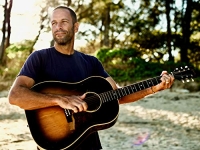 Jack Hody Johnson (born May 18, 1975) is an American singer-songwriter, multi-instrumentalist, actor, record producer, documentary filmmaker and former professional surfer. Johnson is known primarily for his work in the soft rock and acoustic pop genres. In 2001, he achieved commercial success after the release of his debut album, Brushfire Fairytales. Johnson has reached number one on the Billboard 200 chart with his albums Sing-A-Longs and Lullabies for the Film Curious George in 2006, Sleep Through the Static in 2008, To the Sea in 2010 and From Here to Now to You in 2013. His album In Between Dreams peaked at number two on the chart in 2005 and again in 2013.
Jack Hody Johnson (born May 18, 1975) is an American singer-songwriter, multi-instrumentalist, actor, record producer, documentary filmmaker and former professional surfer. Johnson is known primarily for his work in the soft rock and acoustic pop genres. In 2001, he achieved commercial success after the release of his debut album, Brushfire Fairytales. Johnson has reached number one on the Billboard 200 chart with his albums Sing-A-Longs and Lullabies for the Film Curious George in 2006, Sleep Through the Static in 2008, To the Sea in 2010 and From Here to Now to You in 2013. His album In Between Dreams peaked at number two on the chart in 2005 and again in 2013.
John Bucchino
 John Bucchino is an American composer. His hometown is Philadelphia, Pennsylvania.
John Bucchino is an American composer. His hometown is Philadelphia, Pennsylvania.He has done work for several off-Broadway shows and highly acclaimed concerts
Bucchino made his Broadway debut with A Catered Affair as composer/lyricist with four time Tony Award-winner Harvey Fierstein as bookwriter and co-star. The out-of-town production received mixed reviews in its San Diego try-out at the Old Globe (September 20 - November 11, 2007). The Broadway production opened on April 17, 2008, with 116 regular performances and 27 previews performed between March 24 and July 27, 2008.
Off-Broadway, Bucchino has served as musical director of Holly Near: Fire in the Rain in 1993
Carl Michael Bellman
 Carl Michael Bellman (help·info) (4 February 1740 – 11 February 1795) was a Swedish poet and composer. Bellman is a central figure in the Swedish song tradition and remains a very important influence in Swedish music, as well as in Scandinavian literature in general, to this day.
Carl Michael Bellman (help·info) (4 February 1740 – 11 February 1795) was a Swedish poet and composer. Bellman is a central figure in the Swedish song tradition and remains a very important influence in Swedish music, as well as in Scandinavian literature in general, to this day.Bellman was born in Stockholm. His main works are the Songs of Fredman (Fredmans sånger) and the Epistles of Fredman (Fredmans epistlar), each including some 70 songs, many of which are about sociable drinking and/or designed for the occasion of the same. But this aspect of his songs is not the main reason he has become such an icon in the Scandinavian song tradition. A master of rhyme and rhythm, with a wonderful sense for combining words and music, he wrote songs that were innovative and original in form (parodying and refreshing contemporary literary styles was one of his specialities), as well as challenging in subject matter. On the surface, his songs centred to a large extent around themes like the joy of inebriation and the pursuit of sexual pleasure. Against this backdrop, however, he manages to elucidate the tender and fleeting themes of love, death, and the elusive qualities of the "present", the here-and-now, in a unique and moving manner. His songs reflect aspects of the life of the common man in 18th century Stockholm, but by his composition Gustafs skål, an informal royal anthem, he had also acquired the patronage of King Gustav III of Sweden. Some of the characters in his songs are the clockmaker Fredman, the prostitute Ulla Winblad, the ex-soldier, now alcoholic Mowitz and Fader Berg, a virtuoso on several instruments. Some of these were based on living models, some probably not. His songs often make references to Greek and Roman mythological characters such as the ferryman Charon and the God of wine and pleasure, Bacchus.
High School Musical
 High School Musical is an Emmy Award-winning American television film. Upon its release on January 20, 2006, it became the most successful Disney Channel Original Movie (DCOM) ever produced, with a television sequel High School Musical 2 released in 2007 and the feature film High School Musical 3: Senior Year to be released theatrically in October 2008. It will be the first Disney Channel Original movie to have a theatrical sequel. A fourth installment, High School Musical 4, has been announced to be in the writing stages.
High School Musical is an Emmy Award-winning American television film. Upon its release on January 20, 2006, it became the most successful Disney Channel Original Movie (DCOM) ever produced, with a television sequel High School Musical 2 released in 2007 and the feature film High School Musical 3: Senior Year to be released theatrically in October 2008. It will be the first Disney Channel Original movie to have a theatrical sequel. A fourth installment, High School Musical 4, has been announced to be in the writing stages.High School Musical was Disney Channel's most watched movie at its time, with 7.7 million viewers in its premiere broadcast in the US. In the UK, it received 789,000 viewers for its premiere (and 1.2 million viewers overall during the first week), making it the second most watched program for the Disney Channel (UK) of 2006. It was also the first ever Disney Channel Original Movie to be broadcast on the BBC on December 29, 2006. The film's soundtrack was the best-selling album in the United States for 2006.
With a plot described by the author and numerous critics as a modern adaptation of Romeo & Juliet, High School Musical is a story about two high school juniors from rival cliques – Troy Bolton (Zac Efron), captain of the basketball team, and Gabriella Montez (Vanessa Hudgens), a beautiful and shy transfer student who excels in math and science. Together, they try out for the lead parts in their high school musical, and as a result, divide the school. Despite other students' attempts to thwart their dreams, Troy and Gabriella resist peer pressure and rivalry, inspiring others along the way not to "stick with the status quo."
High School Musical was filmed at East High School located in Salt Lake City, Utah, the auditorium of Murray High School, & Downtown Salt Lake City. Murray High School was also the set of: Take Down (1978), Read It and Weep (2006), Minutemen (2008) and High School Musical: Get in the Picture (2008).
Mongo Santamaria
 Ramón "Mongo" Santamaría Rodríguez (April 7, 1917 – February 1, 2003) was a Cuban percussionist and bandleader who spent most of his career in the United States. Primarily a conga drummer, Santamaría was a leading figure in the pachanga and boogaloo dance crazes of the 1960s. His biggest hit was his rendition of Herbie Hancock's "Watermelon Man", which was inducted into the Grammy Hall of Fame in 1998. From the 1970s, he recorded mainly salsa and Latin jazz, before retiring in the late 1990s.
Ramón "Mongo" Santamaría Rodríguez (April 7, 1917 – February 1, 2003) was a Cuban percussionist and bandleader who spent most of his career in the United States. Primarily a conga drummer, Santamaría was a leading figure in the pachanga and boogaloo dance crazes of the 1960s. His biggest hit was his rendition of Herbie Hancock's "Watermelon Man", which was inducted into the Grammy Hall of Fame in 1998. From the 1970s, he recorded mainly salsa and Latin jazz, before retiring in the late 1990s.
Glory Days
 Glory Days is a musical with music and lyrics by Nick Blaemire and a book by James Gardiner about four high school friends reuniting a year after graduation. The musical opened at the Signature Theatre in 2008 and was then produced on Broadway in 2008 but closed after one regular performance.
Glory Days is a musical with music and lyrics by Nick Blaemire and a book by James Gardiner about four high school friends reuniting a year after graduation. The musical opened at the Signature Theatre in 2008 and was then produced on Broadway in 2008 but closed after one regular performance.
Mozart
 Wolfgang Amadeus Mozart, full name Johann Chrysostom Wolfgang Amadeus Mozart (27 January 1756 â 5 December 1791) was a prolific and influential composer of the Classical era. His over 600 compositions include works widely acknowledged as pinnacles of symphonic, concertante, chamber, piano, operatic, and choral music. Mozart is among the most enduringly popular of classical composers, and many of his works are part of the standard concert repertoire.
Wolfgang Amadeus Mozart, full name Johann Chrysostom Wolfgang Amadeus Mozart (27 January 1756 â 5 December 1791) was a prolific and influential composer of the Classical era. His over 600 compositions include works widely acknowledged as pinnacles of symphonic, concertante, chamber, piano, operatic, and choral music. Mozart is among the most enduringly popular of classical composers, and many of his works are part of the standard concert repertoire.Mozart's music, like Haydn's, stands as an archetypal example of the Classical style. His works spanned the period during which that style transformed from one exemplified by the style galant to one that began to incorporate some of the contrapuntal complexities of the late Baroque, complexities against which the galant style had been a reaction. Mozart's own stylistic development closely paralleled the development of the classical style as a whole. In addition, he was a versatile composer and wrote in almost every major genre, including symphony, opera, the solo concerto, chamber music including string quartet and string quintet, and the piano sonata. While none of these genres were new, the piano concerto was almost single-handedly developed and popularized by Mozart. He also wrote a great deal of religious music, including masses; and he composed many dances, divertimenti, serenades, and other forms of light entertainment.
The central traits of the classical style can be identified in Mozart's music. Clarity, balance, and transparency are hallmarks of his work.
Brahms
 Johannes Brahms (May 7, 1833 â April 3, 1897) was a German composer of the Romantic period. He was born in Hamburg and in his later years he settled in Vienna, Austria.
Johannes Brahms (May 7, 1833 â April 3, 1897) was a German composer of the Romantic period. He was born in Hamburg and in his later years he settled in Vienna, Austria.Brahms maintained a Classical sense of form and order in his works â in contrast to the opulence of the music of many of his contemporaries. Thus many admirers (though not necessarily Brahms himself) saw him as the champion of traditional forms and "pure music," as opposed to the New German embrace of program music.
Brahms venerated Beethoven: in the composer's home, a marble bust of Beethoven looked down on the spot where he composed, and some passages in his works are reminiscent of Beethoven's style. The main theme of the finale of Brahms's First Symphony is reminiscent of the main theme of the finale of Beethoven's Ninth, and when this resemblance was pointed out to Brahms he replied that any ass â jeder Esel â could see that.
Ein deutsches Requiem was partially inspired by his mother's death in 1865, but also incorporates material from a Symphony he started in 1854, but abandoned following Schumann's suicide attempt. He once wrote that the Requiem "belonged to Schumann". The first movement of this abandoned Symphony was re-worked as the first movement of the First Piano Concerto.
Brahms also loved the Classical composers Mozart and Haydn. He collected first editions and autographs of their works, and edited performing editions. He also studied the music of pre-classical composers, including Giovanni Gabrieli, Johann Adolph Hasse, Heinrich Schütz and especially Johann Sebastian Bach. His friends included leading musicologists, and with Friedrich Chrysander he edited an edition of the works of François Couperin. He looked to older music for inspiration in the arts of strict counterpoint; the themes of some of his works are modelled on Baroque sources, such as Bach's The Art of Fugue in the fugal finale of Cello Sonata No. 1, or the same composer's Cantata No. 150 in the passacaglia theme of the Fourth Symphony's finale.
Gilbert DeBenedetti
 Pittsburgh, Pennsylvania (USA), getting degrees in Music from Carnegie-Mellon University and from the University of Pittsburgh.
Pittsburgh, Pennsylvania (USA), getting degrees in Music from Carnegie-Mellon University and from the University of Pittsburgh.Besides arranging music for piano, I have enjoyed teaching Music Theory. I taught that subject at the University of Pittsburgh at Greensburg and at the Pittsburgh High School for Creative and Performing Arts (CAPA). I also have been involved with the Advanced Placement Music Theory Exam, developed and administered by the Educational Testing Service and the College Board.
Earth Wind and Fire
 Earth, Wind & Fire (abbreviated as EW&F or simply EWF) is an American band that has spanned the musical genres of R&B, soul, funk, jazz, disco, pop, rock, dance, Latin, and Afro pop. They have been described as one of the most innovative and commercially successful acts of all time. Rolling Stone called them "innovative, precise yet sensual, calculated yet galvanizing" and declared that the band "changed the sound of black pop". VH1 has also described EWF as "one of the greatest bands" ever.
Earth, Wind & Fire (abbreviated as EW&F or simply EWF) is an American band that has spanned the musical genres of R&B, soul, funk, jazz, disco, pop, rock, dance, Latin, and Afro pop. They have been described as one of the most innovative and commercially successful acts of all time. Rolling Stone called them "innovative, precise yet sensual, calculated yet galvanizing" and declared that the band "changed the sound of black pop". VH1 has also described EWF as "one of the greatest bands" ever.
Sergio Mendes
 Sérgio Santos Mendes (Brazilian Portuguese: ; born February 11, 1941) is a Brazilian musician. He has over 55 releases, and plays bossa nova heavily crossed with jazz and funk. He was nominated for an Oscar for Best Original Song in 2012 as co-writer of the song "Real in Rio" from the animated film Rio. Mendes is a unique example of a Brazilian musician primarily known in the United States, where his albums were recorded and where most of his touring took place.Mendes is married to Gracinha Leporace, who has performed with him since the early 1970s. Mendes has also collaborated with many artists through the years, including The Black Eyed Peas, with whom he re-recorded in 2006 a version of his breakthrough hit "Mas que Nada".
Sérgio Santos Mendes (Brazilian Portuguese: ; born February 11, 1941) is a Brazilian musician. He has over 55 releases, and plays bossa nova heavily crossed with jazz and funk. He was nominated for an Oscar for Best Original Song in 2012 as co-writer of the song "Real in Rio" from the animated film Rio. Mendes is a unique example of a Brazilian musician primarily known in the United States, where his albums were recorded and where most of his touring took place.Mendes is married to Gracinha Leporace, who has performed with him since the early 1970s. Mendes has also collaborated with many artists through the years, including The Black Eyed Peas, with whom he re-recorded in 2006 a version of his breakthrough hit "Mas que Nada".
AC/DC
AC/DC are an Australian rock band formed in 1973 by brothers Malcolm and Angus Young. Although the band are commonly classified as hard rock and are considered a pioneer of heavy metal, they have always classified their music as rock and roll.
AC/DC underwent several line-up changes before releasing their first album, High Voltage, in 1975. Membership remained stable until bassist Mark Evans was replaced by Cliff Williams in 1977. The band recorded their highly successful album Highway to Hell in 1979. Lead singer and co-songwriter Bon Scott died on 19 February 1980, after a night of heavy alcohol consumption. The group briefly considered disbanding, but soon ex-Geordie singer Brian Johnson was selected to replace Scott. Later that year, the band released their best-selling album, Back in Black.
The band's next album, For Those About to Rock We Salute You, was their first album to reach number one in the United States. AC/DC declined in popularity soon after drummer Phil Rudd was fired in 1983 and was replaced by future Dio drummer Simon Wright, though the band resurged in the early 1990s with the release of The Razor's Edge. Phil Rudd returned in 1994 (after Chris Slade was asked to leave in favour of him) and contributed to the band's 1995 album Ballbreaker. Stiff Upper Lip was released in 2000 and was well received by critics. The band's most recent album, Black Ice, was released on 20 October 2008.
As of 2008, AC/DC have sold more than 200 million albums worldwide, including 71 million albums in the United States. Back in Black has sold an estimated 45 million units worldwide, making it the highest-selling album by any band and the 2nd highest-selling album in history, behind "Thriller" by Michael Jackson. The album has sold 22 million in the US alone, where it is the fifth-highest-selling album. AC/DC ranked fourth on VH1's list of the "100 Greatest Artists of Hard Rock" and was named the seventh "Greatest Heavy Metal Band of All Time" by MTV. In 2004, the band was ranked number 72 in the Rolling Stone list of the "100 Greatest Artists of All Time".
AC/DC underwent several line-up changes before releasing their first album, High Voltage, in 1975. Membership remained stable until bassist Mark Evans was replaced by Cliff Williams in 1977. The band recorded their highly successful album Highway to Hell in 1979. Lead singer and co-songwriter Bon Scott died on 19 February 1980, after a night of heavy alcohol consumption. The group briefly considered disbanding, but soon ex-Geordie singer Brian Johnson was selected to replace Scott. Later that year, the band released their best-selling album, Back in Black.
The band's next album, For Those About to Rock We Salute You, was their first album to reach number one in the United States. AC/DC declined in popularity soon after drummer Phil Rudd was fired in 1983 and was replaced by future Dio drummer Simon Wright, though the band resurged in the early 1990s with the release of The Razor's Edge. Phil Rudd returned in 1994 (after Chris Slade was asked to leave in favour of him) and contributed to the band's 1995 album Ballbreaker. Stiff Upper Lip was released in 2000 and was well received by critics. The band's most recent album, Black Ice, was released on 20 October 2008.
As of 2008, AC/DC have sold more than 200 million albums worldwide, including 71 million albums in the United States. Back in Black has sold an estimated 45 million units worldwide, making it the highest-selling album by any band and the 2nd highest-selling album in history, behind "Thriller" by Michael Jackson. The album has sold 22 million in the US alone, where it is the fifth-highest-selling album. AC/DC ranked fourth on VH1's list of the "100 Greatest Artists of Hard Rock" and was named the seventh "Greatest Heavy Metal Band of All Time" by MTV. In 2004, the band was ranked number 72 in the Rolling Stone list of the "100 Greatest Artists of All Time".
Tony Renis
 Tony Renis (born May 13, 1938), stage name of Elio Cesari, is an Italian singer, composer, music producer and film actorBorn in Milan, he debuted in the mid-1950s, paired with Adriano Celentano, performing an impression of Dean Martin and Jerry Lewis. In 1958, he signed to the label "Combo Record" as a singer and started releasing covers of Italian and American songs. In 1961, Renis debuted at the Sanremo Music Festival with the song "Pozzanghere".
Tony Renis (born May 13, 1938), stage name of Elio Cesari, is an Italian singer, composer, music producer and film actorBorn in Milan, he debuted in the mid-1950s, paired with Adriano Celentano, performing an impression of Dean Martin and Jerry Lewis. In 1958, he signed to the label "Combo Record" as a singer and started releasing covers of Italian and American songs. In 1961, Renis debuted at the Sanremo Music Festival with the song "Pozzanghere".
Christina Perri
 Christina Perri (born August 19, 1986) is an American singer and songwriter from Philadelphia. Her song "Jar of Hearts" charted in the United States after it was featured on the Fox television show So You Think You Can Dance in 2010. Rolling Stone named her the "Band of the Week" on October 26, 2010. On May 10, 2011, Perri's "Jar of Hearts" was featured on Glee (Season 2, Episode 20 "Prom Queen").
Christina Perri (born August 19, 1986) is an American singer and songwriter from Philadelphia. Her song "Jar of Hearts" charted in the United States after it was featured on the Fox television show So You Think You Can Dance in 2010. Rolling Stone named her the "Band of the Week" on October 26, 2010. On May 10, 2011, Perri's "Jar of Hearts" was featured on Glee (Season 2, Episode 20 "Prom Queen").
Sinead O'Connor
Sinéad Marie Bernadette O'Connor (/ʃɪˈneɪd/ shin-AYD; born 8 December 1966) is an Irish singer-songwriter who rose to fame in the late 1980s with her debut album The Lion and the Cobra. O'Connor achieved worldwide success in 1990 with a new arrangement of Prince's song "Nothing Compares 2 U."
Klaus Badelt
 Klaus Badelt (born 1968) is a German composer, best known for composing film scores.
Klaus Badelt (born 1968) is a German composer, best known for composing film scores.Badelt was born in Frankfurt, Germany. He started his musical career composing for many successful movies and commercials in his homeland. In 1998, Oscar-winning film composer Hans Zimmer invited Badelt to work at Media Ventures in Santa Monica, his studio co-owned by Jay Rifkin. Since then, Badelt has been working on a number of his own film and television projects such as The Time Machine and K-19: The Widowmaker. He has also collaborated with other Media Ventures composers, such as Harry Gregson-Williams, John Powell, and Zimmer.
While collaborating with Zimmer, Badelt has contributed to the Oscar-nominated scores for The Thin Red Line and The Prince of Egypt, as well as writing music for many well known directors including Ridley Scott, Tony Scott, Terrence Mallick, John Woo, Kathryn Bigelow, Jeffrey Katzenberg, Tom Cruise, Sean Penn, Gore Verbinski, and Steven Spielberg.
Badelt co-produced the score to Hollywood box office hit Gladiator, directed by Ridley Scott, as well as writing portions of the score with singer/composer Lisa Gerrard. Having contributed music to Gladiator, Mission: Impossible 2 and Michael Kamen's score for X-Men, Badelt was involved in the three most successful movies in 2000. Badelt also collaborated with Zimmer on other successful films, such as The Pledge, and 2001 blockbusters Hannibal and Pearl Harbor. One of his more famous - and more popular - scores is the score to the 2003 film Pirates of the Caribbean: The Curse of the Black Pearl.
Among Badelt's most critically celebrated scores are the Chinese fantasy film The Promise and Dreamworks' remake of The Time Machine, the latter which earned him the Discovery of the Year Award at the World Soundtrack Awards 2003.
William Finn
 William Alan Finn (born February 28, 1952) is an American composer and lyricist of musicals. His musical Falsettos received the 1992 Tony Awards for Best Music and Lyrics and for Best Book.
William Alan Finn (born February 28, 1952) is an American composer and lyricist of musicals. His musical Falsettos received the 1992 Tony Awards for Best Music and Lyrics and for Best Book.
Craig Bakalian
 Craig Bakalian was born in Philadelphia, Pennsylvania on February 14, 1961. His interest in music was initially apparent at the age of 16 when he began flute studies at the Jenkintown Music School. After graduation from Jenkintown High School, he continued at Temple University where he studied music composition with Clifford Taylor. Most recently, his study at Temple University has expanded to music education with a focus on early childhood music instruction. He received teaching certification in music and is currently teaching music classes to infants, toddlers, preschoolers, and elementary age children in the Mercer County area of New Jersey. He currently lives with his wife and two children in Bucks County, Pennsylvania.
Craig Bakalian was born in Philadelphia, Pennsylvania on February 14, 1961. His interest in music was initially apparent at the age of 16 when he began flute studies at the Jenkintown Music School. After graduation from Jenkintown High School, he continued at Temple University where he studied music composition with Clifford Taylor. Most recently, his study at Temple University has expanded to music education with a focus on early childhood music instruction. He received teaching certification in music and is currently teaching music classes to infants, toddlers, preschoolers, and elementary age children in the Mercer County area of New Jersey. He currently lives with his wife and two children in Bucks County, Pennsylvania.
Grieg
 Edvard Hagerup Grieg (/ɡriːɡ/ GREEG, Norwegian: ; 15 June 1843 – 4 September 1907) was a Norwegian composer and pianist. He is widely considered one of the leading Romantic era composers, and his music is part of the standard classical repertoire worldwide. His use and development of Norwegian folk music in his own compositions brought the music of Norway to international consciousness, as well as helping to develop a national identity, much as Jean Sibelius and Bedřich Smetana did in Finland and Bohemia, respectively.
Edvard Hagerup Grieg (/ɡriːɡ/ GREEG, Norwegian: ; 15 June 1843 – 4 September 1907) was a Norwegian composer and pianist. He is widely considered one of the leading Romantic era composers, and his music is part of the standard classical repertoire worldwide. His use and development of Norwegian folk music in his own compositions brought the music of Norway to international consciousness, as well as helping to develop a national identity, much as Jean Sibelius and Bedřich Smetana did in Finland and Bohemia, respectively.Grieg is the most celebrated person from the city of Bergen, with numerous statues depicting his image, and many cultural entities named after him: the city's largest concert building (Grieg Hall), its most advanced music school (Grieg Academy) and its professional choir (Edvard Grieg Kor). The Edvard Grieg Museum at Grieg's former home, Troldhaugen, is dedicated to his legacy.
Tom Waits
 Thomas Alan Waits (born 7 December 1949) is an American singer-songwriter, composer, and actor. Waits has a distinctive voice, described by critic Daniel Durchholz as sounding "like it was soaked in a vat of bourbon, left hanging in the smokehouse for a few months, and then taken outside and run over with a car." With this trademark growl, his incorporation of pre-rock styles such as blues, jazz, and vaudeville, and experimental tendencies verging on industrial music, Waits has built up a distinctive musical persona. He has worked as a composer for movies and musical plays and as a supporting actor in films, including The Fisher King, Coffee & Cigarettes, Bram Stoker's Dracula, and Short Cuts. He was nominated for an Academy Award for his soundtrack work on One from the Heart.
Thomas Alan Waits (born 7 December 1949) is an American singer-songwriter, composer, and actor. Waits has a distinctive voice, described by critic Daniel Durchholz as sounding "like it was soaked in a vat of bourbon, left hanging in the smokehouse for a few months, and then taken outside and run over with a car." With this trademark growl, his incorporation of pre-rock styles such as blues, jazz, and vaudeville, and experimental tendencies verging on industrial music, Waits has built up a distinctive musical persona. He has worked as a composer for movies and musical plays and as a supporting actor in films, including The Fisher King, Coffee & Cigarettes, Bram Stoker's Dracula, and Short Cuts. He was nominated for an Academy Award for his soundtrack work on One from the Heart.Lyrically, Waits' songs contain atmospheric portrayals of bizarre, seedy characters and places, although he has also shown a penchant for more conventional ballads. He has a cult following and has influenced subsequent songwriters despite having little radio or music video support. His songs are best-known to the general public in the form of cover versions by more visible artistsâfor example, "Jersey Girl," performed by Bruce Springsteen; "Downtown Train" and "Tom Traubert's Blues" performed by Rod Stewart; and "Ol' '55," performed by the Eagles. Although Waits' albums have met with mixed commercial success in his native United States, they have occasionally achieved gold album sales status in other countries. He has been nominated for a number of major music awards and has won Grammy Awards for two albums, Bone Machine and Mule Variations.
Waits currently lives in Sonoma County, California with his wife and their three children.
Vangelis
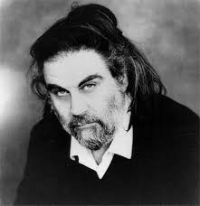 Evangelos Odysseas Papathanassiou (Greek: Ευάγγελος Οδυσσέας Παπαθανασίου ; born 29 March 1943), known professionally as Vangelis (Greek: Βαγγέλης ; English pronunciation: /væŋˈɡɛlᵻs/), is a Greek composer of electronic, progressive, ambient, jazz, pop rock, and orchestral music. He is best known for his Academy Award–winning score for the film Chariots of Fire, composing scores for the films Antarctica, Blade Runner, Missing, 1492: Conquest of Paradise, and Alexander, and the use of his music in the PBS documentary Cosmos: A Personal Voyage by Carl Sagan.
Evangelos Odysseas Papathanassiou (Greek: Ευάγγελος Οδυσσέας Παπαθανασίου ; born 29 March 1943), known professionally as Vangelis (Greek: Βαγγέλης ; English pronunciation: /væŋˈɡɛlᵻs/), is a Greek composer of electronic, progressive, ambient, jazz, pop rock, and orchestral music. He is best known for his Academy Award–winning score for the film Chariots of Fire, composing scores for the films Antarctica, Blade Runner, Missing, 1492: Conquest of Paradise, and Alexander, and the use of his music in the PBS documentary Cosmos: A Personal Voyage by Carl Sagan.After having taking piano lessons from renowned Greek composer Aristotelis Koundouroff, Vangelis began his professional musical career working with several popular bands of the 1960s such as The Forminx and Aphrodite's Child, with the latter's album 666 going on to be recognized as a psychedelic classic. Throughout the 1970s, Vangelis composed music scores for several animal documentaries, including L'Apocalypse Des Animaux, La Fête sauvage and Opéra sauvage; the success of these scores brought him into the film scoring mainstream. In the early 1980s, Vangelis formed a musical partnership with Jon Anderson, the lead singer of progressive rock band Yes, and the duo went on to release several albums together as Jon & Vangelis.
In 1981, he composed the score for the Oscar-winning film Chariots of Fire, for which he won an Academy Award for Best Original Music Score. The soundtrack's single, the film's "Titles" theme, also reached the top of the American Billboard Hot 100 chart and was used as the background music at the London 2012 Olympics winners' medal presentation ceremonies.
Having had a career in music spanning over 50 years and having composed and performed more than 52 albums, Vangelis is one of the most important proponents of electronic music.
Pink
 Alecia Beth Moore (born on September 8, 1979), known professionally as Pink (often stylized as P!nk), is a two-time Grammy-winning American singer-songwriter who gained prominence in 2000.
Alecia Beth Moore (born on September 8, 1979), known professionally as Pink (often stylized as P!nk), is a two-time Grammy-winning American singer-songwriter who gained prominence in 2000.Pink released her first record, the R&B-oriented Can't Take Me Home, in 2000 via LaFace Records. Her pop rock-based second studio album, M!ssundaztood, was released in 2001 and is her biggest seller to date. Her third album, 2003's Try This, failed to match the success of M!ssundaztood. After taking a break, Pink released her fourth studio album, I'm Not Dead (2006), which was successful worldwide. Pink has so far sold over 25 million albums worldwide. Her upcoming album, Funhouse, will be released in October 2008.
Pachelbel
 Johann Pachelbel (baptized September 1, 1653 – buried March 9, 1706) was a German Baroque composer, organist and teacher who brought the south German organ tradition to its peak. He composed a large body of sacred and secular music, and his contributions to the development of the chorale prelude and fugue have earned him a place among the most important composers of the middle Baroque era.
Johann Pachelbel (baptized September 1, 1653 – buried March 9, 1706) was a German Baroque composer, organist and teacher who brought the south German organ tradition to its peak. He composed a large body of sacred and secular music, and his contributions to the development of the chorale prelude and fugue have earned him a place among the most important composers of the middle Baroque era.Pachelbel's work enjoyed enormous popularity during his lifetime; he had many pupils and his music became a model for the composers of south and central Germany. Today, Pachelbel is best known for the Canon in D, the only canon he wrote. In addition to the canon, his most well-known works include the Chaconne in F minor, the Toccata in E minor for organ, and the Hexachordum Apollinis, a set of keyboard variations.
Pachelbel's music was influenced by southern German composers, such as Johann Jakob Froberger and Johann Kaspar Kerll, Italians such as Girolamo Frescobaldi and Alessandro Poglietti, French composers, and the composers of the Nuremberg tradition. Pachelbel preferred a lucid, uncomplicated contrapuntal style that emphasized melodic and harmonic clarity. His music is less virtuosic and less adventurous harmonically than that of Dieterich Buxtehude, although, like Buxtehude, Pachelbel experimented with different ensembles and instrumental combinations in his chamber music and, most importantly, his vocal music, much of which features exceptionally rich instrumentation. Pachelbel explored many variation forms and associated techniques, which manifest themselves in various diverse pieces, from sacred concertos to harpsichord suites.
Sia Furler
 Sia Kate Isobelle Furler is an Australian singer, songwriter, voice actress and director. She started her career as a singer in the acid jazz band Crisp in the mid-1990s in Adelaide. In 1997, when Crisp disbanded, she released her debut studio album, titled OnlySee, in Australia.
Sia Kate Isobelle Furler is an Australian singer, songwriter, voice actress and director. She started her career as a singer in the acid jazz band Crisp in the mid-1990s in Adelaide. In 1997, when Crisp disbanded, she released her debut studio album, titled OnlySee, in Australia.
Evanescence
 Evanescence is an American rock band founded in Little Rock, Arkansas in 1995 by singer/pianist Amy Lee and guitarist Ben Moody.
Evanescence is an American rock band founded in Little Rock, Arkansas in 1995 by singer/pianist Amy Lee and guitarist Ben Moody.After recording two private EPs and a demo CD named Origin, with the help of Bigwig Enterprises in 2000, the band released their first full-length album, Fallen, on Wind-up Records in 2003. Fallen sold more than 15 million copies worldwide and helped the band win two Grammy Awards. A year later, Evanescence released their first live album, Anywhere but Home, which sold more than one million copies worldwide. In 2006, the band released their second studio album, The Open Door, which has sold more than four million copies.
The band has suffered several line-up changes, including co-founder Moody leaving in 2003, followed by guitarist John LeCompt and drummer Rocky Gray in 2007. Lee is now the only original member of Evanescence remaining in the band.
Bart Howard
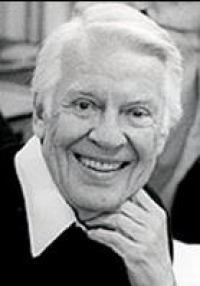 Bart Howard (born Howard Joseph Gustafson; June 1, 1915 — February 21, 2004) was the composer and writer of the famous jazz standard "Fly Me To The Moon", which has been performed by singers (among others) Frank Sinatra, Ella Fitzgerald, Nancy Wilson, Della Reese, Diana Krall, June Christy and Astrud Gilberto. It is also played frequently by jazz and popular musicians around the world.
Bart Howard (born Howard Joseph Gustafson; June 1, 1915 — February 21, 2004) was the composer and writer of the famous jazz standard "Fly Me To The Moon", which has been performed by singers (among others) Frank Sinatra, Ella Fitzgerald, Nancy Wilson, Della Reese, Diana Krall, June Christy and Astrud Gilberto. It is also played frequently by jazz and popular musicians around the world.Howard was born in Burlington, Iowa. He began his career as an accompanist at the age of 16 and played for Mabel Mercer, Johnny Mathis and Eartha Kitt, among others.
"Fly Me To the Moon" was first sung in 1954 by Felicia Sanders at the "Blue Angel" club in Manhattan where the composer became M.C. and accompanist in 1951. The song received wide exposure when Peggy Lee sang it on The Ed Sullivan Show several years later. Bart Howard "lived off" this song for the rest of his life, although he had 49 other songs to his credit.
He died, aged 88, in Carmel, New York. He was survived by a sister Dorothy Lind of Burlington, Iowa and by his companion of 58 years, Thomas Fowler.
Dizzy Gillespie
 John Birks "Dizzy" Gillespie (pronounced /ɡɨˈlɛspi/; October 21, 1917 – January 6, 1993) was an American jazz trumpet player, bandleader, singer, and composer dubbed "the sound of surprise".
John Birks "Dizzy" Gillespie (pronounced /ɡɨˈlɛspi/; October 21, 1917 – January 6, 1993) was an American jazz trumpet player, bandleader, singer, and composer dubbed "the sound of surprise".Together with Charlie Parker, he was a major figure in the development of bebop and modern jazz. He taught and influenced many other musicians, including trumpeters Miles Davis, Fats Navarro, Clifford Brown, Arturo Sandoval, Lee Morgan, Jon Faddis and Chuck Mangione.
Allmusic's Scott Yanow wrote that "Dizzy Gillespie's contributions to jazz were huge. One of the greatest jazz trumpeters of all time (some would say the best), Gillespie was such a complex player that his contemporaries ended up copying Miles Davis and Fats Navarro instead, and it was not until Jon Faddis's emergence in the 1970s that Dizzy's style was successfully recreated . . . Arguably Gillespie is remembered, by both critics and fans alike, as one of the greatest jazz trumpeters of all time.
In addition to featuring in the epochal moments in bebop, he was instrumental in founding Afro-Cuban jazz, the modern jazz version of what early-jazz pioneer Jelly Roll Morton referred to as the "Spanish Tinge". Gillespie was a trumpet virtuoso and gifted improviser, building on the virtuoso style of Roy Eldridge but adding layers of harmonic complexity previously unknown in jazz. Dizzy's beret and horn-rimmed spectacles, his scat singing, his bent horn, pouched cheeks and his light-hearted personality were essential in popularizing bebop.
Edward Grieg
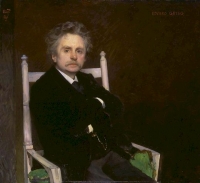 Edvard Hagerup Grieg (15 June 1843 – 4 September 1907) was a Norwegian composer and pianist who composed in the Romantic period. He is best known for his Piano Concerto in A minor, for his incidental music to Henrik Ibsen's play Peer Gynt (which includes Morning Mood and In the Hall of the Mountain King), and for his collection of piano miniatures Lyric Pieces.
Edvard Hagerup Grieg (15 June 1843 – 4 September 1907) was a Norwegian composer and pianist who composed in the Romantic period. He is best known for his Piano Concerto in A minor, for his incidental music to Henrik Ibsen's play Peer Gynt (which includes Morning Mood and In the Hall of the Mountain King), and for his collection of piano miniatures Lyric Pieces.
Samuel A. Ward
 Samuel Augustus Ward (December 28, 1848 – September 28, 1903) was an American organist and composer. Born in Newark, New Jersey, the son of a shoemaker, he studied under several teachers in New York and became an organist at Grace Episcopal Church in his home town in 1880. He married Virginia Ward in 1871, with whom he had four daughters.
Samuel Augustus Ward (December 28, 1848 – September 28, 1903) was an American organist and composer. Born in Newark, New Jersey, the son of a shoemaker, he studied under several teachers in New York and became an organist at Grace Episcopal Church in his home town in 1880. He married Virginia Ward in 1871, with whom he had four daughters.He is remembered for the 1882 tune "Materna", which he intended as a setting for the hymn "O Mother Dear, Jerusalem". This was published ten years later, in 1892. In 1903, after Ward had died, the tune was first combined by a publisher with the Katharine Lee Bates poem "America", itself first published in 1895, to create the patriotic song "America the Beautiful."
Dimrain47
 Dimrain47Musical artist Record label: 1608350 Records DK Albums: The Dimrain47 Collection (2005-2012) Songs
Dimrain47Musical artist Record label: 1608350 Records DK Albums: The Dimrain47 Collection (2005-2012) SongsAt the Speed of Light The Dimrain47 Collection (2005-2012) · 2019 The Falling Mysts The Dimrain47 Collection (2005-2012) · 2019 Infernoplex The Dimrain47 Collection (2005-201
Shoji Meguro
 Shōji Meguro (目黒 将司 Meguro Shōji?, born June 4, 1971) is a Japanese video game composer and director who joined Atlus in 1996 and has composed music for many of their games, mainly those in the Megami Tensei series.
Shōji Meguro (目黒 将司 Meguro Shōji?, born June 4, 1971) is a Japanese video game composer and director who joined Atlus in 1996 and has composed music for many of their games, mainly those in the Megami Tensei series.Born in Tokyo, Japan, Shōji Meguro majored in hydrodynamics at the College of Industrial Technology at Nihon University.
Although his works feature a signature rock style, Meguro experiments with different musical genres, such as orchestral, electronica, jazz, rap, RnB and hip hop from soundtrack to soundtrack. Meguro cites T-Square, Casiopea, Ludwig van Beethoven, and Pyotr Ilyich Tchaikovsky as musical influences.
Kenny Burrell
 Kenneth Earl Burrell (born July 31, 1931) is an American jazz guitarist known for his work on the Blue Note label. His collaborations with Jimmy Smith produced the 1965 Billboard Top Twenty hit album Organ Grinder Swing. He has cited jazz guitarists Charlie Christian and Django Reinhardt as influences, along with blues guitarists T-Bone Walker and Muddy Waters. Furthermore, Jimi Hendrix, Stevie Ray Vaughan and Peter Frampton have cited Burrell as an influence.
Kenneth Earl Burrell (born July 31, 1931) is an American jazz guitarist known for his work on the Blue Note label. His collaborations with Jimmy Smith produced the 1965 Billboard Top Twenty hit album Organ Grinder Swing. He has cited jazz guitarists Charlie Christian and Django Reinhardt as influences, along with blues guitarists T-Bone Walker and Muddy Waters. Furthermore, Jimi Hendrix, Stevie Ray Vaughan and Peter Frampton have cited Burrell as an influence.Burrell is a professor and Director of Jazz Studies at the UCLA Herb Alpert School of Music.
Kohei Tanaka
 Kohei Tanaka (Japanese: 田中 公平, Hepburn: Tanaka Kōhei, born February 14, 1954) is a Japanese composer, arranger, conductor and singer-songwriter. He is affiliated with the music production company Imagine. He has created numerous musical scores for anime television series, OVAs, films, video games and tokusatsu series including Gunbuster, Sakura Wars and One Piece.
Kohei Tanaka (Japanese: 田中 公平, Hepburn: Tanaka Kōhei, born February 14, 1954) is a Japanese composer, arranger, conductor and singer-songwriter. He is affiliated with the music production company Imagine. He has created numerous musical scores for anime television series, OVAs, films, video games and tokusatsu series including Gunbuster, Sakura Wars and One Piece.
Heitor Villa-Lobos
 Heitor Villa-Lobos (March 5, 1887 – November 17, 1959) was a Brazilian composer, described as "the single most significant creative figure in 20th-century Brazilian art music". Villa-Lobos has become the best-known and most significant Latin American composer to date. He wrote numerous orchestral, chamber, instrumental and vocal works. His music was influenced by both Brazilian folk music and by stylistic elements from the European classical tradition, as exemplified by his Bachianas Brasileiras ("Brazilian Bachian-pieces").
Heitor Villa-Lobos (March 5, 1887 – November 17, 1959) was a Brazilian composer, described as "the single most significant creative figure in 20th-century Brazilian art music". Villa-Lobos has become the best-known and most significant Latin American composer to date. He wrote numerous orchestral, chamber, instrumental and vocal works. His music was influenced by both Brazilian folk music and by stylistic elements from the European classical tradition, as exemplified by his Bachianas Brasileiras ("Brazilian Bachian-pieces").His earliest pieces originated in guitar improvisations, for example Panqueca ("Pancake") of 1900. The concert series of 1915–21 included first performances of pieces demonstrating originality and virtuosic technique. Some of these pieces are early examples of elements of importance throughout his œuvre. His attachment to the Iberian Peninsula is demonstrated in Canção Ibéria of 1914 and in orchestral transcriptions of some of Enrique Granados' piano Goyescas (1918, now lost). Other themes that were to recur in his later work include the anguish and despair of the piece Desesperança— Sonata Phantastica e Capricciosa no. 1 (1915), a violin sonata including "histrionic and violently contrasting emotions", the birds of L'oiseau blessé d'une flèche (1913), the mother-child relationship (not usually a happy one in Villa-Lobos's music) in Les mères of 1914, and the flowers of Suíte floral for piano of 1916–18 which reappeared in Distribuição de flores for flute and guitar of 1937.
Reconciling European tradition and Brazilian influences was also an element that bore fruit more formally later. His earliest published work Pequena suíte for cello and piano of 1913 shows a love for the cello, but is not notably Brazilian, although it contains elements that were to resurface later. His three-movement String Quartet no. 1 (Suíte graciosa) of 1915 (expanded to six movements ca. 1947) is influenced by European opera, while Três danças características (africanas e indígenas) of 1914–16 for piano, later arranged for octet and subsequently orchestrated, is radically influenced by the tribal music of the Caripunas Indians of Mato Grosso.
With his tone poems Amazonas (1916, first performed in Paris in 1929) and Uirapurú (1916, first performed 1935) he created works dominated by indigenous Brazilian influences. The works use Brazilian folk tales and characters, imitations of the sounds of the jungle and its fauna, imitations of the sound of the nose-flute by the violinophone, and not least imitations of the uirapuru itself.
Engenheiros do Hawaii
 Engenheiros do Hawaii was a Brazilian rock band formed in Porto Alegre in 1983 that achieved great popularity with their ironic, critically charged songs with heavily semantic lyrics often relying on wordplays. The vocalist and bassist Humberto Gessinger was the only member present since the original lineup.
Engenheiros do Hawaii was a Brazilian rock band formed in Porto Alegre in 1983 that achieved great popularity with their ironic, critically charged songs with heavily semantic lyrics often relying on wordplays. The vocalist and bassist Humberto Gessinger was the only member present since the original lineup.
Yanni
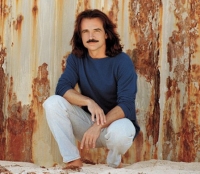 Yanni (born Yiannis Hrysomallis (pronounced Chrysomallis), (Greek: Γιάννης Χρυσομάλλης, classical transcription Giannis Chrysomallis), on November 14, 1954 in Kalamata, Greece) is a self-taught pianist, keyboardist, and composer. After receiving a B.A. in psychology, he would instead seek a life in music though he had no formal training and could not read a note.
Yanni (born Yiannis Hrysomallis (pronounced Chrysomallis), (Greek: Γιάννης Χρυσομάλλης, classical transcription Giannis Chrysomallis), on November 14, 1954 in Kalamata, Greece) is a self-taught pianist, keyboardist, and composer. After receiving a B.A. in psychology, he would instead seek a life in music though he had no formal training and could not read a note.He earned Grammy nominations for his 1992 album, Dare to Dream, and the 1993 follow-up, In My Time. His breakthrough success came with the 1994 release of Yanni Live at the Acropolis, deemed to be the second best-selling music video of all time, (behind Michael Jackson's video for Thriller with nine million units). Yanni has since performed live in concert before in excess of two million people in more than 20 countries around the world. He has accumulated more than 35 platinum and gold albums globally, with sales totaling over 20 million copies. Yanni is considered to be one of the top fundraisers of all time for public television. His compositions have been included in all Olympic Games television broadcasts since 1988, and his music has been used extensively in television and televised sporting events. His music is frequently described as "new age", though he prefers the term "contemporary instrumental". The regents of the University of Minnesota conferred upon Yanni the honorary degree of Doctor of Humane Letters.
Search for Free Sheet Music
You can make a search through the entire collection of sheets.
You can make a search through the entire collection of sheets.
































































































